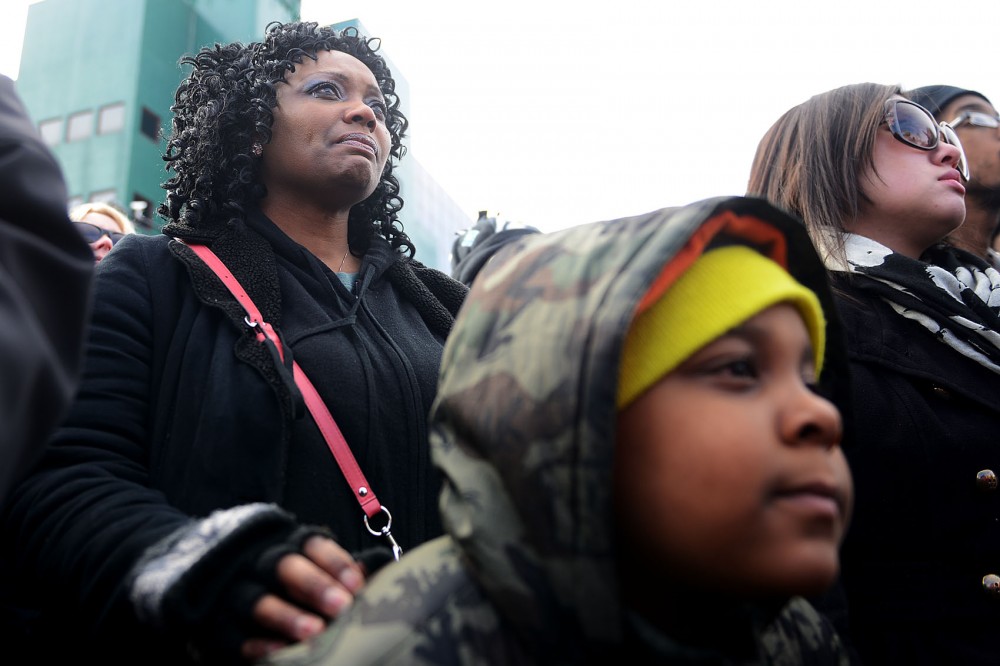Thousands gathered at the intersection of University and Snelling avenues in St. Paul on Monday to march 4 miles in protest of police violence against black people.
The local demonstration occurred amid other protests nationwide marking the holiday in remembrance of the civil rights leader, Martin Luther King Jr. The Twin Cities march ended at the steps of the state Capitol, where speakers called for racial equality and an end to police brutality.
Yelling chants of “black lives matter,” demonstrators used spoken word, singing and dancing to endure the more than four-hour walk.
“In the legacy of Dr. Martin Luther King, we will be peaceful, we will be nonviolent and we will move forward,” said Michael McDowell, an organizer for Black Lives Matter Minneapolis.
Young people, including many University of Minnesota students, made up a large portion of the crowd.
“This is the first day where most of the people I know are acknowledging MLK’s accomplishments but also acknowledging that we have a long way to go,” said Hannah Gray, a University student.
At the Capitol, speakers presented a list of demands, which included required cultural competency training for law enforcement officers and adopting legislation to end racial profiling.
“I’m hoping that people, especially legislators and officials, they see that people care for these issues and that they need to be addressed, especially police brutality.” said Coretta Osayi Enabulele, a University family social science senior.
State troopers, Ramsey County and St. Paul police officers monitored the march.
St. Paul Police Sgt. Paul Paulos said Monday morning before the march that the number of officers at the event would vary based on the number of participants.
“Our goal here is to have a peaceful march, to make sure that everyone is safe and secure and that they feel that they have a right to say what they need to say,” he said.
Demonstrators attempted to move the march onto I-94, but state troopers blocked the ramp onto the freeway.
The crowd chanted, “We will take 94,” but after a five-minute standoff, the march continued down Concordia Avenue.
During the march, demonstrators stopped to stage two “die-ins:” one on a bridge over the interstate and another at a police building.
Metro Transit announced the Green Line light rail was experiencing delays within the first couple hours of the march, but the trains were running again after 4 p.m. on Monday.
At about 5 p.m., the remaining demonstrators held a candlelit vigil in front of the state Capitol to honor Marcus Golden, a black man who was shot and killed by St. Paul police on Wednesday. His family led the march and later gave speeches when the crowd stopped.
Some University of Minnesota students joined the march to raise awareness for police brutality and the killing of unarmed black people.
“The majority of the U.S. sees this as an excuse to sleep in or get drunk on Sunday. … [T]hat to me seems like spitting in the face of Martin Luther King,” said graduate student Jesus Estrada-Perez said.
He said the march was the best way to spend the day off, a sentiment others seemed to agree with.
“[We are here] to honor the legacy of Dr. King and to continue to protest against the violence that’s permeating our society,” said Liz Young, a first-year Law School student.
Other students joined the protest to condemn the use of race in University crime alerts.
“I push to remove race from crime alerts because research shows that it doesn’t help,” said graduate student Nicholas Goldsmith.
During fall 2013’s uptick in violent crime around the University, many campus leaders took issue with suspect descriptions that included information regarding race but few other details — an issue that seemed to linger in Monday’s display against police violence.
“I think inequality is the most disgusting thing in the human race. If America is really the freest country in the world, then everyone should be able to have that freedom, and that’s why I came out,” sophomore Laura Schneider said.








